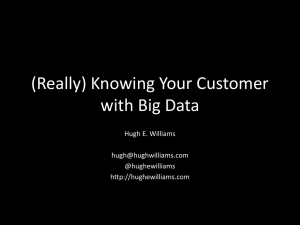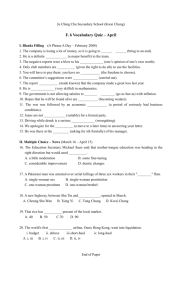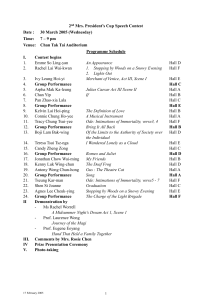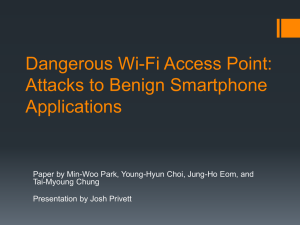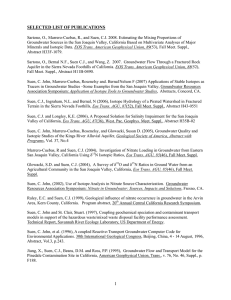service_leadership_in_an_uncertain_era_
advertisement
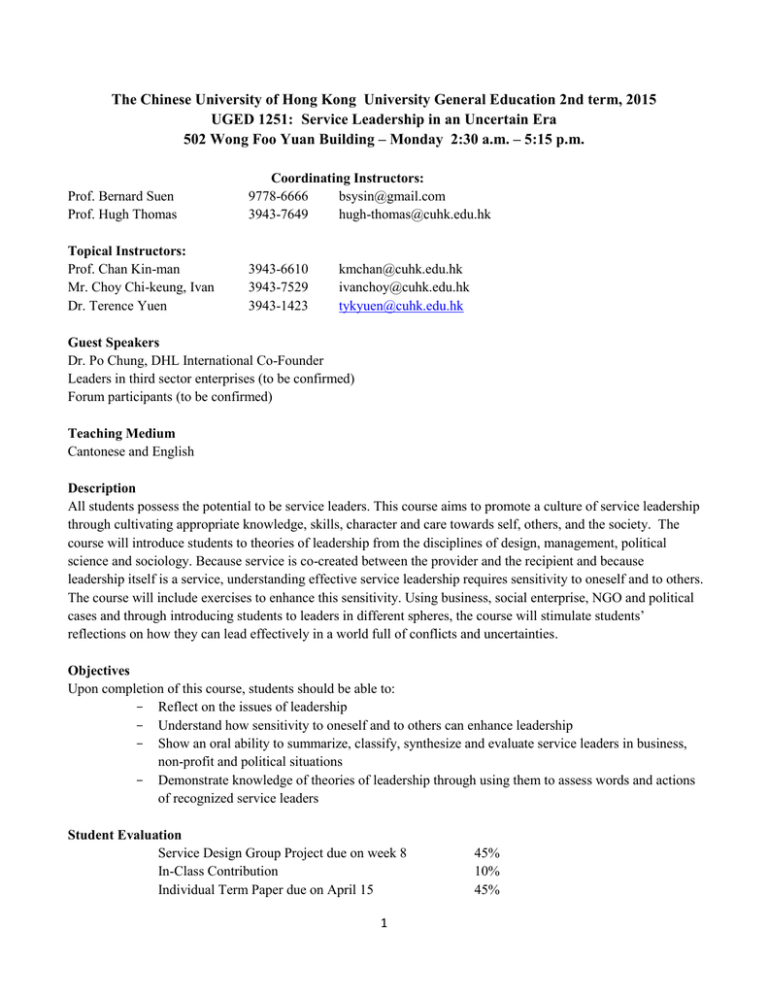
The Chinese University of Hong Kong University General Education 2nd term, 2015 UGED 1251: Service Leadership in an Uncertain Era 502 Wong Foo Yuan Building – Monday 2:30 a.m. – 5:15 p.m. Prof. Bernard Suen Prof. Hugh Thomas Coordinating Instructors: 9778-6666 bsysin@gmail.com 3943-7649 hugh-thomas@cuhk.edu.hk Topical Instructors: Prof. Chan Kin-man Mr. Choy Chi-keung, Ivan Dr. Terence Yuen 3943-6610 3943-7529 3943-1423 kmchan@cuhk.edu.hk ivanchoy@cuhk.edu.hk tykyuen@cuhk.edu.hk Guest Speakers Dr. Po Chung, DHL International Co-Founder Leaders in third sector enterprises (to be confirmed) Forum participants (to be confirmed) Teaching Medium Cantonese and English Description All students possess the potential to be service leaders. This course aims to promote a culture of service leadership through cultivating appropriate knowledge, skills, character and care towards self, others, and the society. The course will introduce students to theories of leadership from the disciplines of design, management, political science and sociology. Because service is co-created between the provider and the recipient and because leadership itself is a service, understanding effective service leadership requires sensitivity to oneself and to others. The course will include exercises to enhance this sensitivity. Using business, social enterprise, NGO and political cases and through introducing students to leaders in different spheres, the course will stimulate students’ reflections on how they can lead effectively in a world full of conflicts and uncertainties. Objectives Upon completion of this course, students should be able to: - Reflect on the issues of leadership - Understand how sensitivity to oneself and to others can enhance leadership - Show an oral ability to summarize, classify, synthesize and evaluate service leaders in business, non-profit and political situations - Demonstrate knowledge of theories of leadership through using them to assess words and actions of recognized service leaders Student Evaluation Service Design Group Project due on week 8 In-Class Contribution Individual Term Paper due on April 15 1 45% 10% 45% Tentative Schedule Week Date Topic 1 11-Jan Course Introduction Service Leadership Theories of leadership I : Heifetz Chan Kin-man Bernard Suen Hugh Thomas 2 18-Jan Service leadership in Business Northouse; Zigarelli, Hung Fuk Tong case Hugh Thomas 3 25-Jan Service Design I Parker, S. and J. Heapy Bernard Suen 4 1-Feb Service Design II Parker, S. and J. Heapy Bernard Suen 5 15-Feb Cases of Service Leadership in Busines Guest Lecture: Po Chung Cisco China and Constellation cases Po Chung Hugh Thomas 6 22-Feb Student Presentations Service Design Group Project Due Bernard Suen 7 29-Feb Service Leadership in Non-Profits Drayton, Chung and Ip Terence Yuen 8 7-Mar Cross Sector Leadershp Riders for Health in Africa Terence Yuen Guest Lecturer 9 14-Mar Political Leadershp: Traditions de Tocqueville; Confucius Hugh Thomas 10 21-Mar Political Leadership Forum -- Choy Chi Keung plus two guests 11 11-Apr A Synthesis: Service leadership in an uncertain world : -- Chan Kin-man Bernard Suen Hugh Thomas 12 18-Apr Wrap up: leaders you wish to follow -- Chan Kin-man Reading / Assignment Instructors Required Readings Week 1 1. Heifetz, Ronald, “Mobilizing Adaptive Work” Leadership Without Easy Answers. Harvard University Press, Cambridge, 1994) Chapter 4. 2. Heifetz, Ronald, “Creative Deviance on the Frontline” Leadership Without Easy Answers. Harvard University Press, Cambridge, 1994) Chapter 8. Week 2 3. Northouse, Peter, Leadership: Theory and Practice, Sage, Thousand Oaks, 2013. Chapter 1 4. Zigarelli, Mike “Ten Leadership Theories in Five Minutes” Youtube Video https://www.youtube.com/watch?v=XKUPDUDOBVo 5. Hung Fuk Tong video https://www.youtube.com/watch?v=f9Fojm4ccys Weeks 3 6. Parker, S. and J. Heapy (2006). The Journey to the Interface – How public service design can connect users to reform, Demos. Chapter 1 Weeks 4 7. Parker, S. and J. Heapy (2006). The Journey to the Interface – How public service design can connect users to reform, Demos. Chapters 3 and 4 Week 5 7. Thomas, Hugh and Robert P. Lee, “Cisco and Cloud-based Education in China”, SLI Case, Hong Kong. 2 https://www.youtube.com/watch?v=Fa9uTc1JKDI 8. Thomas, Hugh “Constellation: the Distribution of Minibonds” SLI Case, Hong Kong. https://www.youtube.com/watch?v=o6BzUnbfddk 9. Chung, Po, Service Reborn: the Knowledge, Skills and Attitudes of Service Companies, Lexingford, New York, 2012. Chapter 1. 10. HKSLI Website: SLI Introduction http://hki-slam.org/index.php?r=article&catid=3 Week 6 Your service design group presentations Week 7 11. Drayton, Bill. (2006). Everyone a changemaker: Social entrepreneurship’s ultimate goal. Innovations: Technology, Governance, Globalization, 1(1), 80-96. 12. Chung, Po and Saimond Ip The First 10 Yards: the 5 Dynamics of Entrepreneurship Cengage Learning, Singapore, 2009 Chapters 2 and 3. Week 8 13. Au, Tsiu and Chan Dialogue in the Dark Richard Ivey School of Business Case, 2014 14. Au, Kevin & Anna Tsui, “Diamond Cab: Investment Of A Venture Philanthropy Fund”, SLI Case, Hong Kong https://www.youtube.com/watch?v=4iiuhNxDz5k 15. Riders for Health in Africa https://www.youtube.com/user/RidersForHealthTV 16. Austin, James E. “Guidelines for Collaborating Successfully” Chapter 9 in The collaboration challenge how nonprofits and businesses succeed through strategic alliances Jossey-Bass Publishers, San Francisco, 2000 Week 10 17. Alex de Tocqueville Democracy in America excerpts 18. Confucius Excerpts China Text Project http://ctext.org/ Recommended Readings Blanchard, K., Zigarmi, P. and Zigarmi D Leadership and the one Minute Manager William Morrow & Co., New York, 1982. Cass R. Sunstein, Why societies need dissent, Harvard University Press, Cambridge, Mass., 2003. Chung, P & S. Ip, The First Ten Yards: The Five Dynamics of Entrepreneurship, Cengage, Singapore, 2009 . Chung, P Service Reborn: the Knowledge, Skills and Attitudes of Service Companies Lexingford, New York, 2012. Drucker, Peter, The Age of Discontinuity Heinemann, London, 1968. Goffman, Erving, The Presentation of Self in Everyday Life, Anchor Book, New York, 1959. (chapters 2 & 6) Haifetz, Ronald Alexander Grashow, and Marty Linsky, The Practice of Adaptive Leadership: Tools and Tactics for Changing Your Organization and the World, Harvard Business Press, Boston, Mass., 2009 Heifetz, Ronald. Leadership Without Easy Answers. Harvard University Press, Cambridge, 1994. Moritz, S, Service Design: Practical access to an evolving field. London, 2005 Northouse, Peter Leadership: Theory and Practice, Sage, Thousand Oaks, 2013. Perry, James, The Jossey-Bass Reader on Nonprofit and Public Leadership, Jossey-Bass, San Francisco, 2010. Philips, Donald T., Martin Luther King, Jr. on Leadership, NY:Warner Books, 1998. Rotberg, Robert I., Transformative Political Leadership , Chicago: University of Chicago Press, 2012. Saul D. Alinsky, Rules for Radicals, NY: Vintage Books,1989. Siegel, D The Mindful Brain: Reflection and Attunement in the Cultivation of Well-being, Norton, New York, 2007 3 Details of Student Evaluation 1. Individual Term Paper due on April 18 (45%) Each student is required to submit (in one hard copy and one soft copy through Veriguide) an individual term paper of no more than 2,000 words in English on the subject “A Good Leader That I Want To Follow”. The essay should describe a real leader in the field of government/politics, business and/or the civil society/NGO/social enterprise sector who has achieved sufficient fame to allow you to conduct secondary source research. Your essay should discuss how your leader demonstrates leadership consistent the topics/concepts covered in the course. Your leader may not be any of the leaders from the video-assisted cases or the guest speakers introduced in this class and may not be a leader from last year’s class of UGED 1251. To help you in your work, we will post individual term papers from last year whose writers consent to the postings and who will be available to discuss with you their leaders. 2. Service Design Group Project due on 22 February (45%) Each student will join a group of from 3 to 5 students to design a service or product that solves a problem for an identified target group. The service design may be for a for-profit or not-for-profit good or service, a political movement or a social event. The only constraints are that the service must enhance the value of the target group and must be feasible. The group will present their service design in a video of not more than 5 minutes and a class discussion of not more than 15 minutes. Group marks will be adjusted by group peer assessments. 3. In-Class Oral Contribution (10%) Please attend all classes and contribute to our discussions of service leadership. Citations of Sources Whatever work you submit must be your own. Claiming work written by others to be your own is plagiarism, a serious academic offence. Plagiarism will not be tolerated. We encourage you to use any and all relevant sources but whenever you quote directly you must use quotation marks around your direct quote and insert a footnote and whenever you paraphrase another person’s words, you must insert a footnote. In either case, your footnote must contain a full citation that will enable the reader to find the source, independently verify facts, determine the extent to which your ideas derive from the source and follow your original reasoning. We hope that you will find this course informative, thought-provoking and useful. 4
